What Dog Food to Feed Lab When Stopped Tolerating Fiid
Written by Dr. Marcelle Landestoy, DVM

If you own a Labrador retriever, you will likely agree that this good-natured breed is always on the lookout for food.
Unfortunately, many foods are considered dangerous.
Though some human foods are perfectly safe, several contain harmful ingredients that your dog should avoid.
Foods your Labrador Retriever should avoid include onions, garlic, avocados, chocolate, grapes, and bones. Foods that you might not know are dangerous for your Lab include raw meat, pineapple, macadamia nuts, caffeinated drinks, and alcohol. Always consult with your vet before feeding your dog new food.
As a licensed veterinary doctor, I will explore in this post several foods that are considered toxic to dogs, along with foods that may cause your lab discomfort so you can limit or eliminate them from their diet.
Foods You Should Not Feed Your Labrador Retriever
Whether you have experience raising a Lab or are just starting, I want to make this guide as simple as possible for you to understand.
To achieve this, I'll adopt a simple concept that we all know and use daily—the traffic lights system.
We all know that the traffic lights consist of three primary colors: green, yellow, and red.
These colors will form the basis of our food classification based on the severity of their impacts.
GREEN will represent those foods that aren't toxic to your Lab but which, once consumed, may yield some mild discomfort or pain. In this case, your pup may experience mild diarrhea, bloating, or vomiting.
Additionally, the consumption of these foods over a long duration may yield adverse long-term effects.
We can relate them to kids consuming candies. If your child consumes sweets in moderation, they won't experience any adverse effects; however, overconsumption causes tooth cavities or decay.
YELLOW will represent those foods that cause moderate to severe effects on your Lab.
These effects include vomiting, stomach upsets, and breathing difficulties. Once consumed, these foods will necessitate a visit to the pet clinic.
Lastly, RED will be our 'danger' color representing the highly toxic foods your Lab shouldn't by any chance consume.
If your pup consumes any of the foods in this category, you should seek immediate medical attention to save its life.
Green: Mild Discomfort
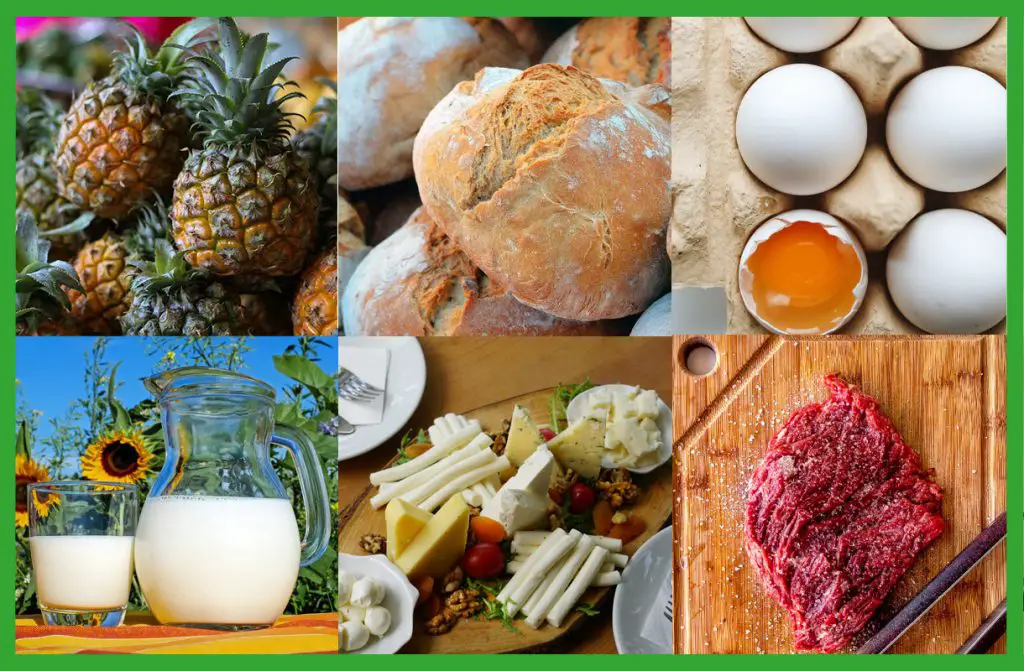
Listed below are some foods that aren't toxic to your Lab, but which can cause illness and discomfort if consumed in excess.
Milk and Dairy Products
As much as we consider milk a favorite treat or reward for our pups, it's not the best.
Before filling your Lab's bowl with milk, think of the people you've come across who are lactose intolerant; what's their experience with milk and dairy products?
Surprisingly, most dogs are lactose intolerant, meaning they lack enough lactase in their bodies to break down the lactose (sugar) in milk.
As a result, if they consume an excess of milk or other dairy products like ice cream, there will be incomplete digestion causing mild stomach upsets, vomiting, and diarrhea.
Additionally, if your pup consumes milk and dairy products over a long period, the lactose builds up in their bodies and is eventually converted into fats.
Do you know the long-term effects of the accumulation of excess fat in the body? Yes, you guessed it right, obesity.
And, given that Labs are prone to obesity, you will end up having an obese Lab. I'm sure no one wants an obese dog!
While milk is not entirely a 'NEVER' food for your Lab, it's important to watch out for the amount you feed him and the frequency of consumption.
Bread
Bread is safe for consumption by dogs but only as an occasional treat.
Bread doesn't cause any direct harm to your canine friend, but it's known to add calories to the body leading to excessive weight gain.
Therefore, when feeding bread to your Lab, do so in moderation.
Additionally, you should ensure that it doesn't have additives and sweeteners that may be harmful to your dog.
Don't forget to check out extra ingredients such as raisins and nuts that are also not safe for your Lab's consumption.
Cottage Cheese
Dogs like cottage cheese, and although it's not toxic to them, you should only ever offer it in small amounts.
You may find that your Lab experiences some mild stomach upsets, nausea, and diarrhea after consuming cottage cheese.
Although these effects aren't life-threatening, you should practice limiting cheese intake for the long-term health benefit of your canine friend.
Pineapple
As a fruit, pineapple is an ideal nutrient-dense snack for your pooch as it contains a high amount of vitamins, fiber, and minerals.
Unfortunately, too much of it is not suitable for your dog.
Excessive consumption of pineapples may give your Lab mild digestive issues, nausea, vomiting, and diarrhea.
Additionally, pineapples contain a high fruit sugar content, an excess of which may be converted into fats.
Since Labs are prone to obesity, overconsumption of pineapples may cause extreme weight gain.
Therefore, watch out for the amount you feed them!
Almonds
The occasional bite of almond won't kill your Lab. However, like other dry fruits, almonds aren't easily digestible, and once consumed, can cause mild digestive issues, vomiting, and diarrhea.
Additionally, almonds have high-calorie content and often expose your Lab to obesity.
Raw Meat or Eggs

Although giving your Lab raw meat or eggs on an occasional basis won't kill him, you may be exposing him to salmonella poisoning.
Raw meat contains multiple bacterial pathogens such as salmonella spp and E.coli that may cause food poisoning.
Additionally, raw meat may contain tapeworms, among other parasites that can be harmful to your dog when ingested.
When feeding raw meat to your Lab, don't include internal organs such as the liver and kidney since they may contain accumulated toxins from their parent host.
Similarly, raw eggs contain salmonella spp and Avidin, an enzyme that inhibits the absorption of Vitamin B7 (biotin), causing fur issues in your furry canine friend.
Cat Food
If you have both cats and dogs in your home, you may at times use cat food as a substitute for dog food.
While this won't harm your Lab, it's not advisable for long-term use.
Since felines and canines have different nutritional needs, their foods are manufactured with varying dietary components.
Cat food contains a high concentration of sugars and proteins, which aren't good for your canine friend.
Therefore, if you make it a habit to feed your canine friend with cat food, he may end becoming obese.
He'll convert the excess sugars and proteins in feline food into fats, thus gaining excess weight.
What To Do if Your Dog Eats These Foods
You're probably worried about how to handle your Lab if he consumes any of the foods above.
This is common for every Lab parent because your goal is to see him happy and healthy.
If your pup consumes any of these foods, don't panic; he'll be okay.
However, monitor him for any signs that appear to persist and consult a vet if you are in doubt.
Generally, these 'green' foods are safe for consumption, but you need to limit their intake.
Yellow: Moderate to Severe Discomfort
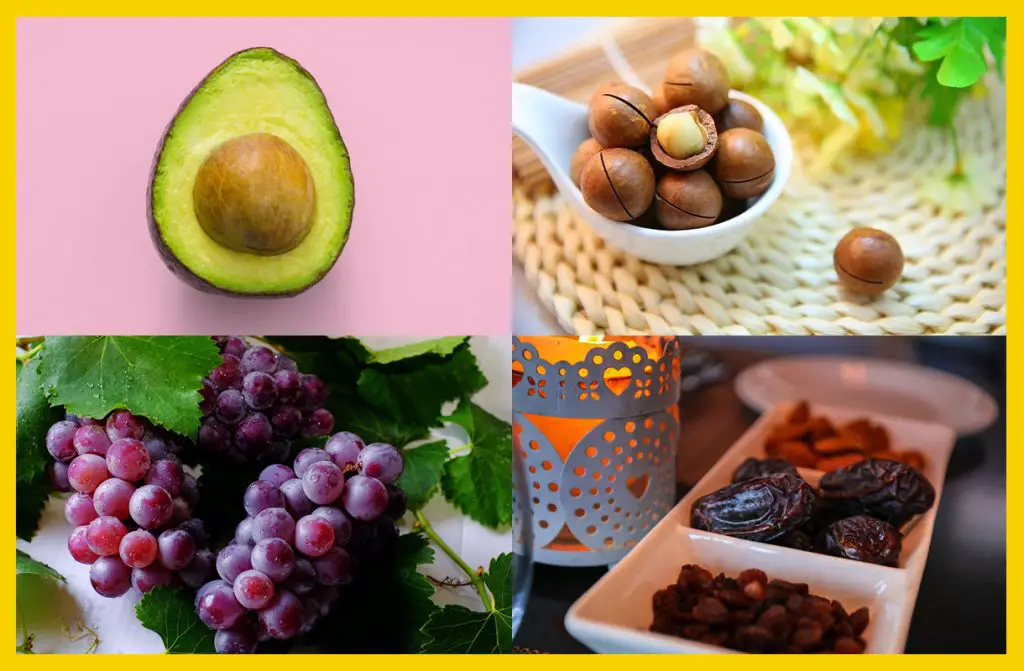
Let's now look at the 'yellow' foods that can cause moderate to severe discomfort, sometimes requiring medical attention.
Avocados
This delicious creamy ball of goodness isn't a good treat for your Lab, because this 'superfood' has a high-calorie content.
And that's not all; it also has a toxic element known as persin.
Persin is present in almost every part of it, from the shell and the pit to the flesh, and once consumed, it causes severe vomiting and diarrhea.
If consumed in large quantities, it can damage the heart and lung tissues.
Another thing about avocados is the pit, which poses a choking hazard and can also cause intestinal blockage.
If that happens, your lab will probably need surgery to have it removed.
Garlic and Onions
Who doesn't like the taste of onions and garlic in their food? Dogs, too, can't resist the taste, especially human food.
However, you shouldn't feed your Lab food containing any of these two elements.
Both garlic and onions are members of the Allium family, and they contain a high amount of disulfides and sulfoxides, which are toxic to dogs.
When consumed by dogs, they cause severe stomach upset and hemolytic anemia—they break down red blood cells leaving your Lab struggling for oxygen.
Regardless of their form, whether cooked, raw, powdered, or blended, onions and garlic are highly toxic to your pup.
Nutmeg
Generally, nutmeg isn't safe for dogs because it contains myristicin, which is poisonous to dogs.
When consumed, it causes severe stomach pains, high blood pressure, dry mouth, increased heart rate, seizures, and disorientation.
Always check any foods that may contain nutmeg, such as baked goods, cereals, and granola bars, keeping them out of reach where possible.
Macadamia Nuts
If you had thoughts of sharing macadamia nuts with your canine friend, please don't.
Macadamia nuts are known to be toxic to dogs. If your Lab consumes them, he may experience severe vomiting, tremors, muscle weakness, hyperthermia, depression, and paralysis of the hindquarters.
As with nutmeg, macadamia nuts are often found in baked goods and cereals.
Always check the ingredient lists before sharing your snacks with your dog, and keep them out of their reach in the pantry.
Tomatoes
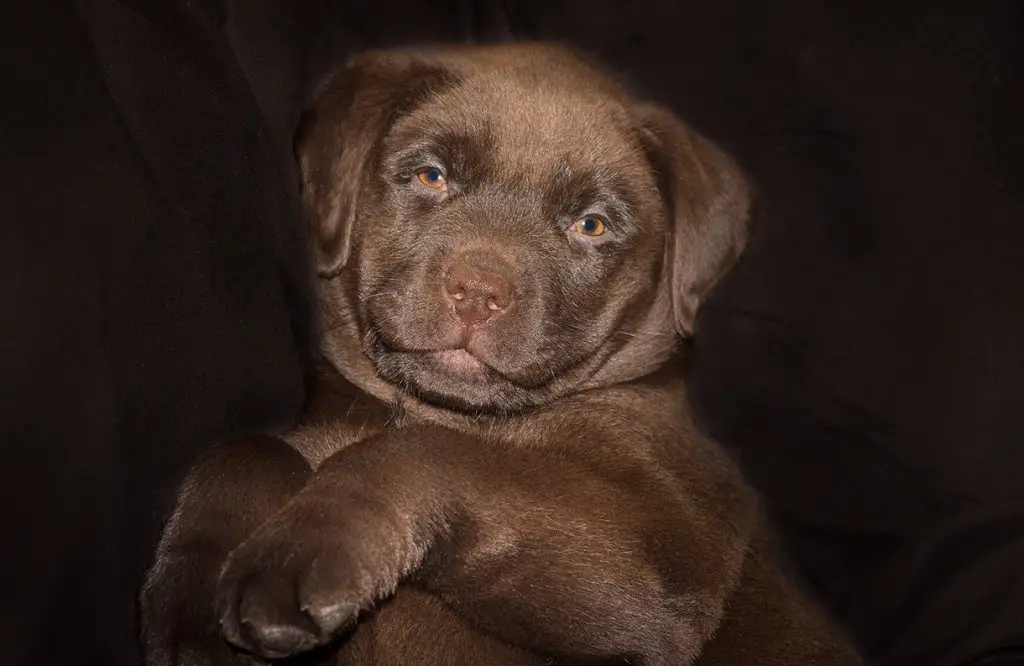
Although ripe tomatoes are safe for your dog, green or unripe tomatoes can be dangerous.
Though green tomatoes aren't toxic to humans, they contain a toxic substance known as tomatine that adversely affects your Lab's health.
If your pup consumes lots of green tomatoes, he'll likely experience severe stomach upset, abnormal heart rate, difficulty breathing, and muscle weakness.
If you grow tomatoes at home, try to keep them high in a greenhouse or behind a netting to prevent your dog from plucking the unripe fruits from the plant.
Grapes and Raisins
Grapes and raisins are toxic to Labs, and when ingested, they reduce blood flow into the kidney.
A reduction in blood flow can cause kidney failure, and if no medical attention is provided, you might lose your canine friend.
Some signs of grape or raisin poisoning include severe dehydration, abdominal pain, vomiting, coma, and seizures.
When eliminating grapes and raisins, also eliminate their derivatives such as alcohol.
What To Do if Your Dog Eats These Foods
So, as a caring Lab parent, what should you do if your pup consumes these foods? Since most of these foods are highly toxic to your Lab, you should seek immediate medical attention.
Depending on the notable signs, you may consult your vet to guide you at home.
In most cases, vets recommend induced vomiting to eliminate the toxic elements from your Lab's bloodstream before the situation worsens.
Never attempt to induce vomiting if your pet has difficulties breathing or is choking.
Additionally, do it under your vet's instructions to avoid causing more harm to your pup.
In some cases, the symptoms may not show immediately, depending on the quantity consumed and your Lab's age.
Therefore, keep a close eye on him if you suspect he has consumed any of these foods.
If the condition is severe, you may need to leave your Lab in the clinic for close monitoring.
Red: Dangerous or Poisonous
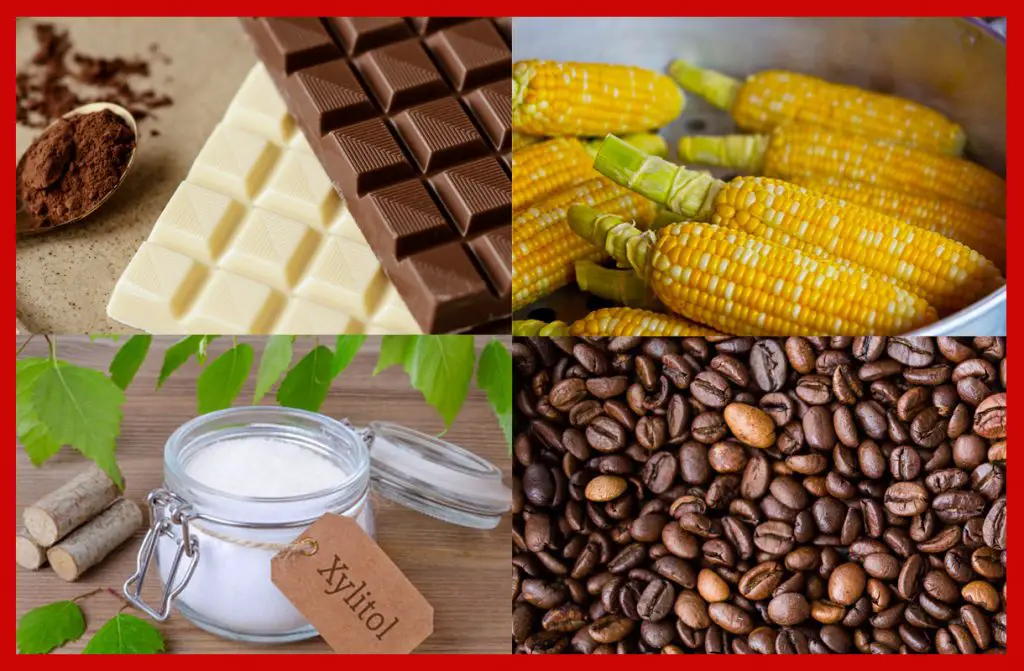
These are the highly toxic foods your Lab should never consume.
Bones
Most dog owners believe that bones are good for their dog's jaws. However, be cautious not to give your Lab cooked bones.
Cooking makes bones brittle, and they will splinter easily, causing injuries to your Lab's mouth, throat, or gastrointestinal tract.
There is also a problem with some large uncooked bones. Some of them are weighty and so hard that they can inflict dental damage to your pup.
In some cases, these bones can crack or break their teeth, leading to potential infections and jaw pain.
Caffeinated Beverages
Never share your cup of coffee or tea with your Lab. With the high level of caffeine in both of these drinks, your dog will almost immediately feel the effects.
When consumed, they act as stimulants affecting your pup's nervous system.
Caffeinated drinks cause severe vomiting, hyperactivity, accelerated heartbeat, tremors, and seizures.
A higher intake can cause heart and liver failure, which can ultimately be deadly.
Whether ingested in small or massive amounts, caffeinated drinks are highly toxic to canines, and you should always keep them out of your dog's reach.
Chocolate
As much as you love snacking on chocolate, NEVER be tempted to share even a tiny piece with your Lab.
Chocolate is one of the most highly toxic foods for dogs since it contains caffeine and theobromine.
As earlier mentioned, caffeine acts as a stimulant that causes hyperactivity and accelerates heartbeat, among other effects.
Theobromine, on the other hand, is a diuretic and cardiac stimulant. It affects the kidney's normal functioning as a diuretic stimulant, leaving your Lab excessively thirsty and with frequent urination.
Additionally, being a cardiac stimulant, theobromine increases the heart or irregular heartbeat rhythm, which can cause death.
A small amount may not be fatal depending on his size, but it is not worth the risk.
Therefore, always keep chocolate and chocolate products far away from your Lab.
Xylitol
Xylitol is an artificial sweetener found in most human foods where it's used as a sugar substitute.
Although not toxic to humans, it is highly poisonous to dogs. You can find Xylitol in foods such as ketchup, baked foods, gums, candies, vitamin supplements, and toothpaste.
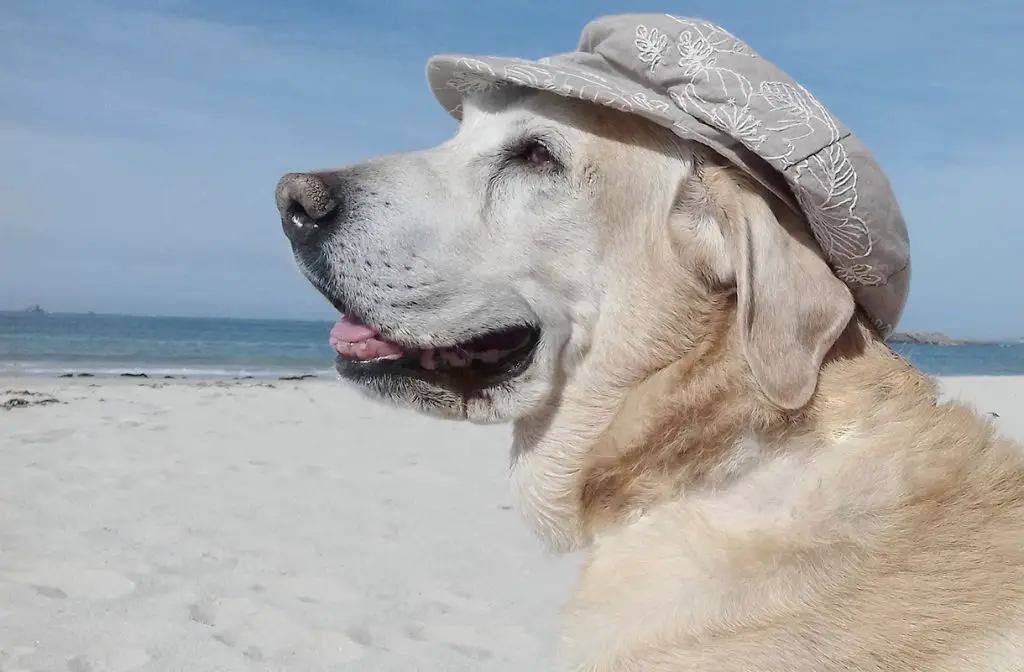
When your Lab consumes food substances containing Xylitol, he can experience a rapid drop in blood sugar levels, severe seizures, and muscle weakness.
If consumed in high amounts, Xylitol can cause liver damage or result in death.
Raw Yeast Dough
Raw yeast dough is highly unsafe for your Lab to consume. When digested, the yeast cells cause fermentation in your pup's body producing alcohol, which is poisonous to dogs.
Additionally, the dough continues to rise and expand in your canine's stomach, causing severe bloating, difficult breathing, and possible gut twitching.
With massive ingestion of raw yeast dough, your Lab can quickly die.
Corn on the Cob
On its own, corn is safe for consumption by dogs. However, when it's on the cob, it poses a choking hazard to your canine friend.
The cob can easily get stuck on your Lab's throat or intestines, causing a gastrointestinal blockage putting your pooch at a high risk of death.
What To Do If Your Dog Eats These Foods
Generally, your Lab should NEVER consume any of the foods in the red category.
However, since accidents are bound to happen, and it is not uncommon to find that your canine friend has consumed raw yeast dough, cooked bones, chocolate, or a caffeinated drink.
So, what should you do?
In this case, you should IMMEDIATELY seek medical attention.
Given the high level of toxicity from these foods, it might be a matter of life and death, and the faster you act, the safer your Lab will be.
Your vet may advise you to induce vomiting before rushing him to the clinic in a bid to reduce the adverse effects.
Conclusion
We often give our dogs many foods without a second thought, such as table scraps or food they may grab from the counter.
But as a dog owner, it is essential to know what your Labrador Retriever can and can't eat.
With some foods, such as dairy or pineapple, chances are your dog will suffer from an upset stomach, and you may need to clean up some diarrhea.
However, foods like chocolate and alcohol are very toxic, and if your Labrador Retriever consumes them, you will need to seek immediate medical attention.
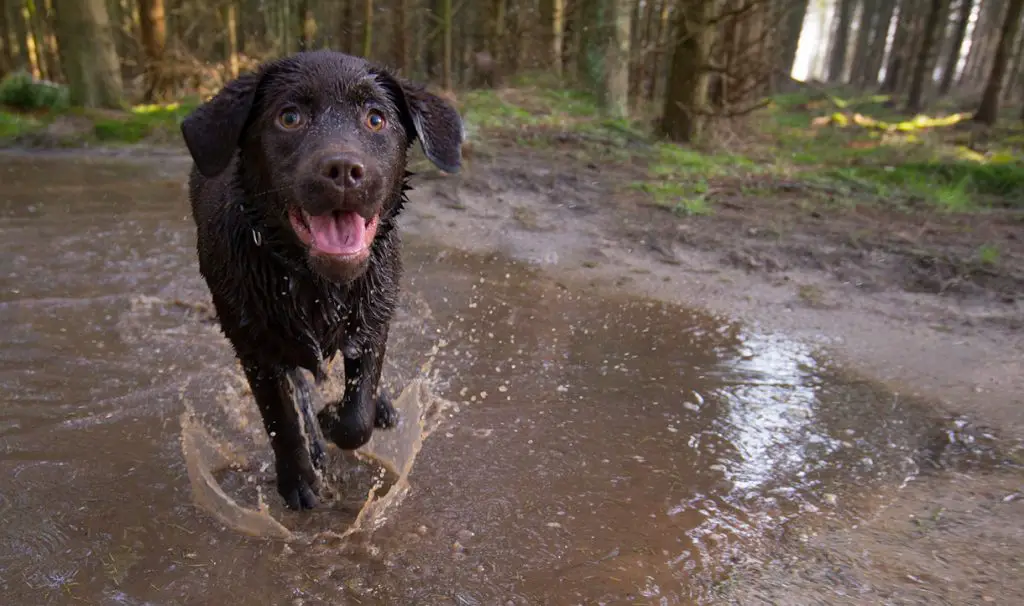
Sources
- American Kennel Club: Labrador Retriever
- Pet Health Network: Inducing Vomiting in Your Dog
- Easy Retriever Training: What food can Labradors NOT eat?
- Labrador Secrets: Dangerous Foods To Avoid For Your Labrador Retriever:
- Inspire Dogs: What Foods Can Labrador Not Eat? (18 Food Items)
Read more about the Labrador Retriever breed in my one-page labrador owner guide
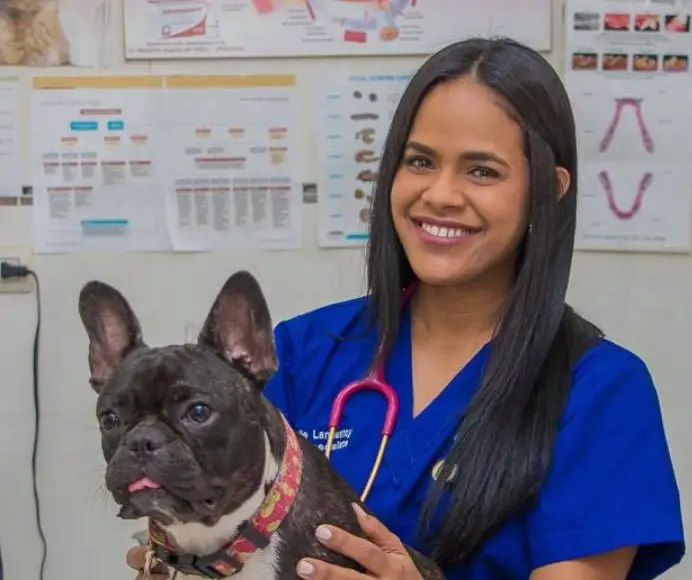 |
| Veterinary Hospital Director at UCE Dr. Marcelle is a general veterinarian with a Small Animal Medicine Specialty | Director of the UCE School of Veterinary Medicine | Certified by the International Veterinary Acupuncture Society |
Source: https://vetpetguide.com/foods-your-labrador-retriever-should-avoid/
0 Response to "What Dog Food to Feed Lab When Stopped Tolerating Fiid"
Post a Comment